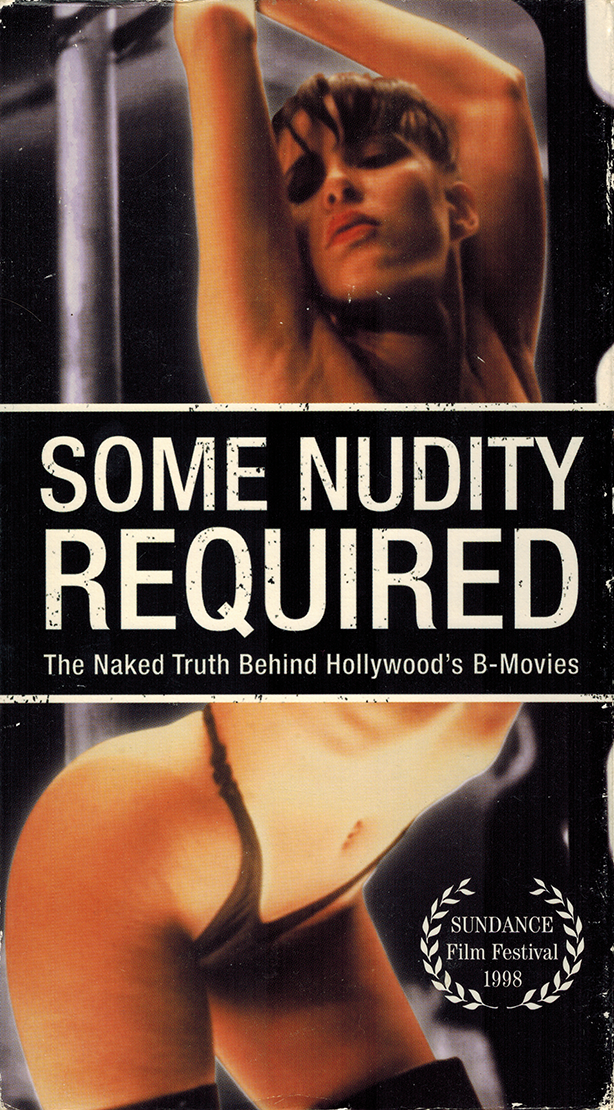Inspirational Films, Part Two: Some Nudity Required

A documentary featuring Roger Corman, Jim Wynorski and Julie Strain? Guaranteed good time, right? Eighty minutes of crazy anecdotes set to goofy visuals?
Yeah, this is not that.
Unlike more recent documentaries chronicling the work of Roger Corman, such as Corman’s World and Machete Maidens Unleashed, there really isn’t anything fun or whimsical about Some Nudity Required. But then, it isn’t so much about Corman as it is an indictment of the movies he makes, and others like them. There’s also a self-reflexive through-line that goes into some pretty dark territory. So it’s not exactly a light-hearted romp exploring the wacky and wild world of B-movies.
Director and star Odette Springer scored some of Corman’s flicks in the nineties, and makes no bones about how much she despised the material. Based on her experience and insight—and maybe some personal issues (that’s not a dismissal; her background is used to drive the narrative)—she feels very strongly that B-movies degrade women, and the people making the movies exploit those women on screen and off.
Springer comes out swinging with Maria Ford’s death scene from Slumber Party Massacre 3. In or out of context, it would be hard to defend (imagine if a scene from Henry: Portrait of a Serial Killer got spliced into, well, Slumber Party Massacre 3). Sure, it could be argued that the third chapter in our favorite slasher trilogy wanted to make a statement about violence towards women in film, but not everyone in the audience is going to grasp that subtext (I certainly didn’t when I first saw it as a teenage boy).

Maria’s interviews go on to paint the B-movie factory as dishonest, lecherous and sometimes downright vile. If what she says is true, then there are some pretty shady people making movies (okay, not the hardest thing to believe). Numerous references are made to her and others being encouraged to get breast implants, and if you watch Perfect Fit (made three years after this doc), it’s fairly apparent she was eventually convinced to go under the knife. Of course, me noticing that might just confirm one or two of the movie’s assertions, so I’ll digress.
I initially saw this about fifteen years ago, and, as a young horror and exploitation fan, it did color my opinion of how some of my favorite movies were made (yes, I just might consider Chopping Mall one of my favorite movies). While it was clear this doc had an axe to grind, it’s got a lot of real actors and directors speaking candidly—and mostly negatively—about the movies they’ve worked on.
The only people really in favor of this brand of filmmaking besides Corman don’t always help their cause. That irascible Jim Wynorski comes off as the quintessential sleazy producer (but do check out the documentary chronicling one of his film shoots, Popatopolis—it’s illuminating). We’re left with a somewhat one-sided view of the B-movie biz, although that doesn’t automatically discount the points being made.

Why am I prattling on about a twenty-year-old, VHS-only documentary that sounds like kind of a buzzkill? Couple reasons. For one thing, it was made at a time when you couldn’t just throw a rock at the internet and hit a documentary about genre movies. Deserves some kudos for that. Also, it happens to be really compelling. Think nineties art-house version of an E! True Hollywood Story—but without the bars and blurs hiding the nudity. And whether or not it wins what seems to be its main argument—that exploitation movies demean and mistreat women—it poses some important questions and provides a lot of food for thought. Being a fan of this stuff is in my bones at this point, but it doesn’t hurt to consider why that is.
I would love to see a DVD release featuring a new interview of Springer and Corman, to see how everyone feels about everything now. Corman’s interviews imply he was unaware of the tone this documentary would take (or was just totally cool with it), and I would be really interested in hearing what he might say if his hackles got raised. He’s such a distinguished and eloquent guy, I think it would be fascinating to see him get into a serious debate.
Did I mention I’m a huge fan of Corman? Even so, it was easy enough to see Springer’s side of things, and I invite you to decide for yourself. I mean, if you feel like tracking this down. And paying a lot. And getting a little depressed about the kinds of movies to which you’ve sorta devoted a good chunk of your life.
Maybe just wait for the DVD.
